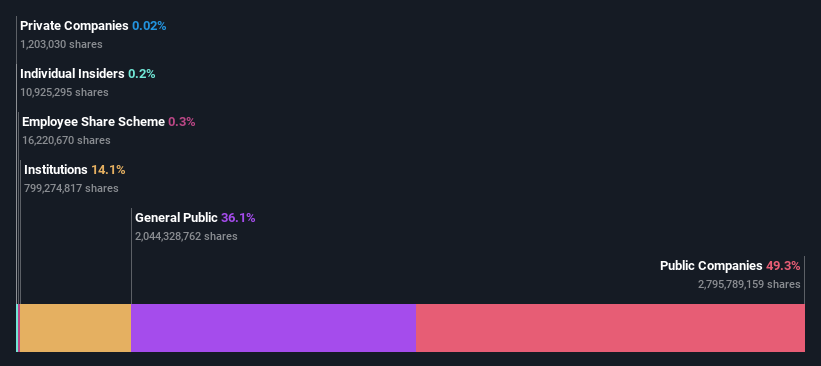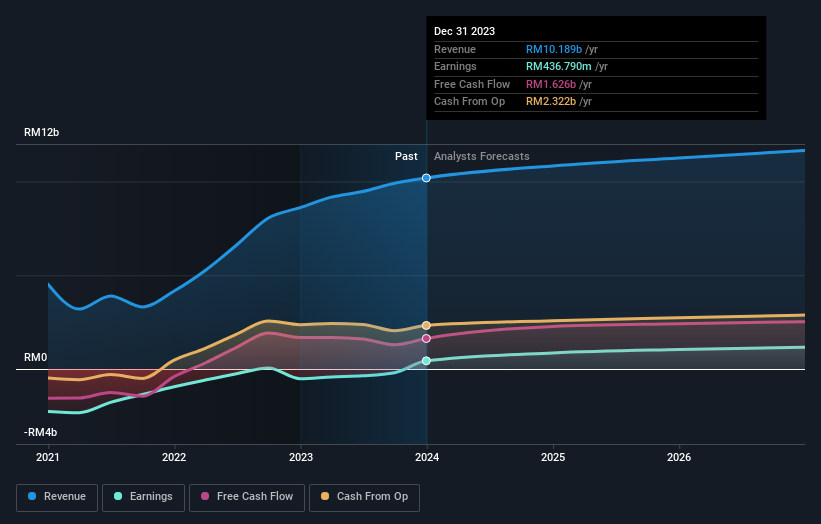Genting Malaysia Berhad's (KLSE:GENM) largest shareholders are public companies with 49% ownership, individual investors own 36%
Key Insights
Genting Malaysia Berhad's significant public companies ownership suggests that the key decisions are influenced by shareholders from the larger public
A total of 2 investors have a majority stake in the company with 51% ownership
If you want to know who really controls Genting Malaysia Berhad (KLSE:GENM), then you'll have to look at the makeup of its share registry. And the group that holds the biggest piece of the pie are public companies with 49% ownership. In other words, the group stands to gain the most (or lose the most) from their investment into the company.
And individual investors on the other hand have a 36% ownership in the company.
Let's take a closer look to see what the different types of shareholders can tell us about Genting Malaysia Berhad.
See our latest analysis for Genting Malaysia Berhad
What Does The Institutional Ownership Tell Us About Genting Malaysia Berhad?
Institutions typically measure themselves against a benchmark when reporting to their own investors, so they often become more enthusiastic about a stock once it's included in a major index. We would expect most companies to have some institutions on the register, especially if they are growing.
We can see that Genting Malaysia Berhad does have institutional investors; and they hold a good portion of the company's stock. This can indicate that the company has a certain degree of credibility in the investment community. However, it is best to be wary of relying on the supposed validation that comes with institutional investors. They too, get it wrong sometimes. It is not uncommon to see a big share price drop if two large institutional investors try to sell out of a stock at the same time. So it is worth checking the past earnings trajectory of Genting Malaysia Berhad, (below). Of course, keep in mind that there are other factors to consider, too.
Hedge funds don't have many shares in Genting Malaysia Berhad. Genting Berhad is currently the company's largest shareholder with 49% of shares outstanding. The second and third largest shareholders are AIA Investment Management Private Limited and The Vanguard Group, Inc., with an equal amount of shares to their name at 1.6%.
After doing some more digging, we found that the top 2 shareholders collectively control more than half of the company's shares, implying that they have considerable power to influence the company's decisions.
While it makes sense to study institutional ownership data for a company, it also makes sense to study analyst sentiments to know which way the wind is blowing. There are plenty of analysts covering the stock, so it might be worth seeing what they are forecasting, too.
Insider Ownership Of Genting Malaysia Berhad
The definition of company insiders can be subjective and does vary between jurisdictions. Our data reflects individual insiders, capturing board members at the very least. Company management run the business, but the CEO will answer to the board, even if he or she is a member of it.
Most consider insider ownership a positive because it can indicate the board is well aligned with other shareholders. However, on some occasions too much power is concentrated within this group.
Our data suggests that insiders own under 1% of Genting Malaysia Berhad in their own names. It's a big company, so even a small proportional interest can create alignment between the board and shareholders. In this case insiders own RM29m worth of shares. Arguably, recent buying and selling is just as important to consider. You can click here to see if insiders have been buying or selling.
General Public Ownership
With a 36% ownership, the general public, mostly comprising of individual investors, have some degree of sway over Genting Malaysia Berhad. While this group can't necessarily call the shots, it can certainly have a real influence on how the company is run.
Public Company Ownership
Public companies currently own 49% of Genting Malaysia Berhad stock. It's hard to say for sure but this suggests they have entwined business interests. This might be a strategic stake, so it's worth watching this space for changes in ownership.
Next Steps:
While it is well worth considering the different groups that own a company, there are other factors that are even more important. Consider for instance, the ever-present spectre of investment risk. We've identified 2 warning signs with Genting Malaysia Berhad (at least 1 which doesn't sit too well with us) , and understanding them should be part of your investment process.
If you would prefer discover what analysts are predicting in terms of future growth, do not miss this free report on analyst forecasts.
NB: Figures in this article are calculated using data from the last twelve months, which refer to the 12-month period ending on the last date of the month the financial statement is dated. This may not be consistent with full year annual report figures.
Have feedback on this article? Concerned about the content? Get in touch with us directly. Alternatively, email editorial-team (at) simplywallst.com.
This article by Simply Wall St is general in nature. We provide commentary based on historical data and analyst forecasts only using an unbiased methodology and our articles are not intended to be financial advice. It does not constitute a recommendation to buy or sell any stock, and does not take account of your objectives, or your financial situation. We aim to bring you long-term focused analysis driven by fundamental data. Note that our analysis may not factor in the latest price-sensitive company announcements or qualitative material. Simply Wall St has no position in any stocks mentioned.

 Yahoo Finance
Yahoo Finance 

